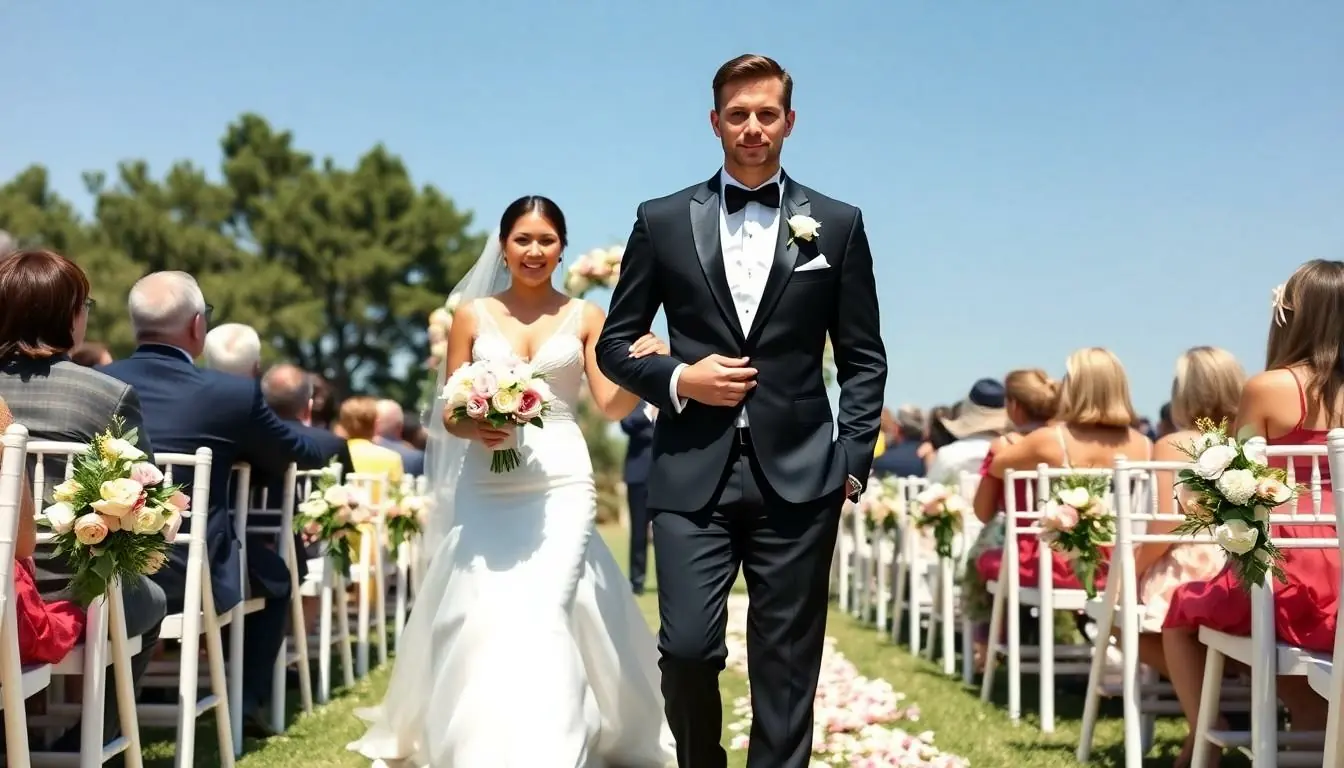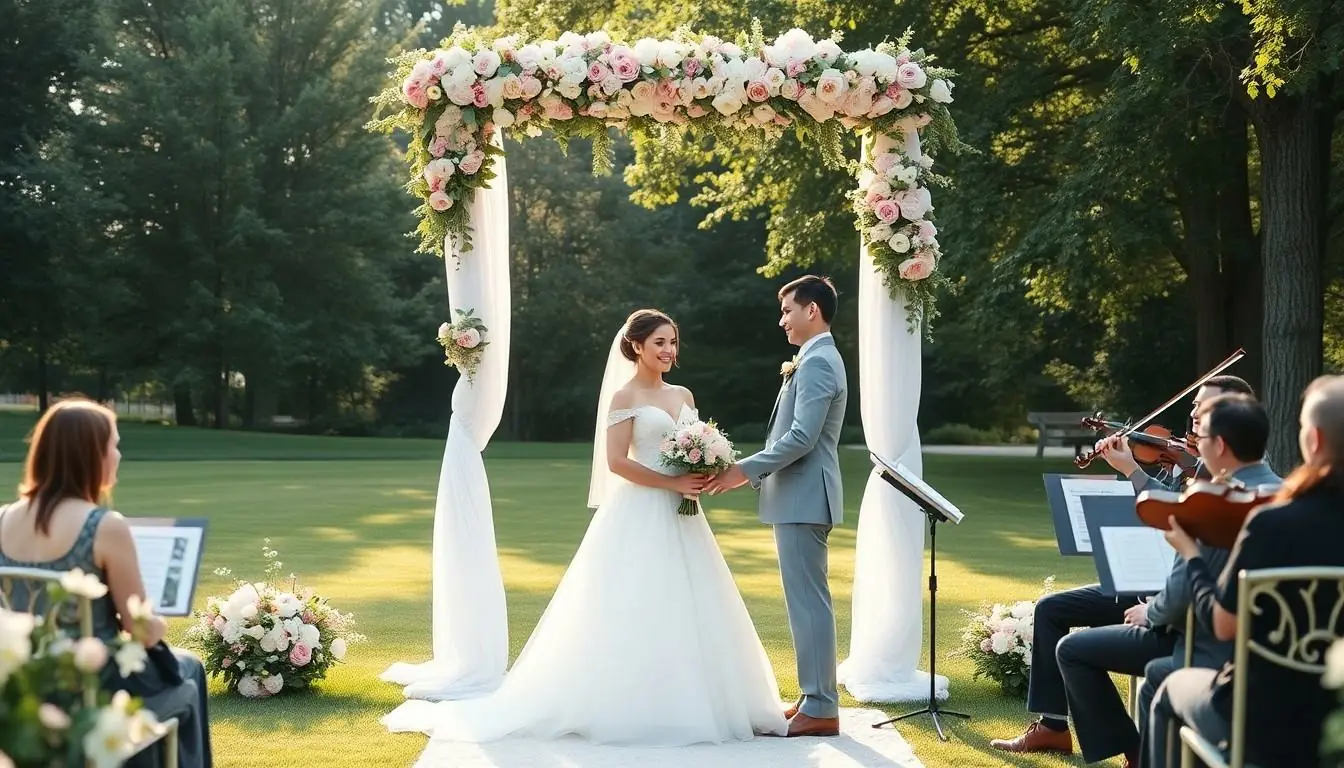Picture this: a beautiful wedding ceremony, the sun shining, and love is in the air. But wait—what’s that? A string quartet playing a timeless classical piece that makes hearts flutter and toes tap. Wedding music sets the tone for the entire day, and when it comes to classical selections, it’s like adding a sprinkle of magic to the occasion.
From the elegant strains of Vivaldi to the romantic melodies of Chopin, classical music can elevate any wedding experience. It’s not just for stuffy events; it’s for couples who want to blend tradition with a touch of sophistication. So, whether you’re walking down the aisle or sharing your first dance, classical wedding music can create unforgettable moments that even your great-aunt Edna will rave about for years to come. Let’s dive into the enchanting world of wedding music that’ll have everyone saying, “I do!” to the perfect playlist.
Table of Contents
ToggleThe Importance of Classical Music in Weddings
Classical music plays a crucial role in setting the tone for weddings. It brings a sense of sophistication and elegance to any ceremony. This genre, encompassing composers like Vivaldi, Chopin, and Mozart, creates an enchanting atmosphere that elevates the overall experience.
Many couples choose classical pieces for key moments during their wedding day. For instance, moving selections often accompany the bridal march down the aisle, enhancing emotional connections between the couple and their loved ones. The gentle notes of a string quartet can evoke feelings of romance and nostalgia, creating memorable moments.
Additionally, classical music caters to diverse tastes. From timeless symphonies to lyrical operas, various pieces resonate with guests and reflect the couple’s unique personalities. Some couples opt for lighter classical arrangements during cocktail hours, ensuring a seamless transition from the ceremony to the reception.
Using classical music also signifies a commitment to tradition. Many cultures have embraced classical pieces for generations, uniting guests through their shared appreciation of this art form. Couples often find comfort in these time-honored selections, reinforcing their desire for a meaningful celebration.
Incorporating classical arrangements into wedding playlists can also make the event feel more cohesive. The flow of various classical pieces enhances the ambiance, allowing guests to fully immerse themselves in the celebration. By prioritizing these selections, couples guarantee an unforgettable wedding experience.
Ultimately, classical music enriches weddings by creating an elegant atmosphere, honoring traditions, and crafting lasting memories. Its ability to resonate emotionally with attendees solidifies its importance in wedding music.
Choosing the Right Classical Pieces

Selecting the right classical pieces enhances the overall wedding experience. A thoughtfully curated playlist adds sophistication and emotion to each moment.
Popular Wedding Music Classical Selections
Familiar works often feature prominently in wedding ceremonies. Some of the most popular selections include Pachelbel’s “Canon in D,” which creates a serene atmosphere. Mendelssohn’s “Wedding March” frequently marks the bride’s entrance, making it an iconic choice. Another staple is Vivaldi’s “Spring” from The Four Seasons, bringing uplifting energy. Additionally, Handel’s “Arrival of the Queen of Sheba” adds a regal touch, appropriate for processional moments. Other ensembles favor Chopin’s “Nocturne in E-flat Major” for romantic interludes. Each of these compositions captivates guests and emphasizes the wedding’s emotional significance.
Tailoring Music to Different Wedding Themes
Different wedding themes provide unique settings for classical music. For a vintage-themed wedding, choosing pieces like Beethoven’s “Ode to Joy” brings a timeless feel. Modern weddings, on the other hand, may incorporate contemporary arrangements, blending classical and modern styles. Rustic outdoor ceremonies benefit from lighter string quartets, creating a warm, inviting ambiance. Glamorous events often call for lavish orchestral arrangements to enhance the opulence. A beach wedding might suit airy compositions such as Debussy’s “Clair de Lune,” effortlessly complementing the serene backdrop. Adapting classical selections to match the wedding theme enriches the overall experience for all attendees.
Live Performances vs. Recorded Music
Choosing between live performances and recorded music significantly impacts the wedding atmosphere. Each option offers distinct benefits and considerations.
Benefits of Live Classical Performances
Live classical performances create an immersive experience for guests. Musicians bring unique energy and spontaneity, elevating emotional connections during key moments, like the bridal march. Professional performers can adjust their playing to suit the venue’s acoustics, enhancing overall sound quality. Couples often appreciate the visual aspect of live performers, adding elegance to the ceremony. Additionally, live classical music fosters interactivity, allowing guests to engage with the musicians, making memories that are more personal.
Considerations for Recorded Classical Music
Recorded classical music offers convenience and cost-effectiveness. It provides greater control over playlists and allows couples to include a wider selection of pieces. Reliability is another factor, as digital tracks guarantee consistent sound quality. With advances in technology, high-quality recordings deliver the rich textures of orchestras or string quartets. However, selecting the right audio equipment becomes crucial to ensure the best sound experience at the venue. Time constraints may limit the couples’ opportunities to rehearse live musicians, making recorded options a practical choice for busy schedules.
Enhancing the Wedding Experience with Classical Music
Classical music enhances the wedding experience by setting a sophisticated tone. It creates a romantic and timeless atmosphere that captivates both the couple and their guests.
Creating a Memorable Atmosphere
Selecting classical pieces like Bach’s “Air on the G String” or Tchaikovsky’s “Waltz of the Flowers” helps craft an enchanting backdrop. Strings and woodwinds fill the air with warmth, encouraging beautiful connections during the ceremony. Guests remember these atmospheres long after the event, making significant moments even more special. Additionally, a well-curated playlist of classical compositions contributes to the unique character of each wedding. Appropriate transitions between pieces ensure a seamless flow, allowing the experience to unfold naturally.
Emotional Impact of Classical Music on Guests
Classical music evokes deep emotions, fostering a sense of unity among guests during the ceremony. Recognizable melodies like Vivaldi’s “Winter” or Mozart’s “Ave Verum Corpus” often stir nostalgic feelings. Couples choose these selections to create shared memories, enhancing the emotional depth of their wedding day. Live performances further amplify these effects, making moments feel personal and immersive. Through melody and harmony, classical music connects everyone present, enriching the celebration and leaving lasting impressions.
Wedding music plays a vital role in shaping the atmosphere of a couple’s special day. Classical selections offer a unique blend of elegance and emotional resonance that can enhance every moment of the ceremony. From the bridal march to the final dance, these timeless pieces create a backdrop that resonates with guests and fosters deep connections.
Choosing the right classical music can transform a wedding into an unforgettable experience. Whether opting for live performances or curated playlists, the thoughtful selection of pieces ensures that each moment is imbued with sophistication and charm. As couples explore various classical options, they not only honor tradition but also reflect their personal style, making their celebration truly one-of-a-kind. Embracing classical music in wedding planning is a decision that promises to leave lasting memories for everyone involved.



